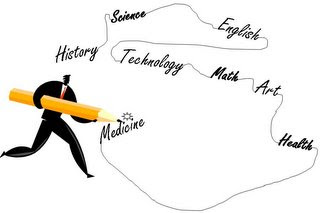 "WAC workshop pedagogy should model both write-to-learn and write-to-communicate pedagogies." (McLeod). Herein lies the key point of writing. Perhaps we can best sum it up with the argument that writing is about making connections. The concept of implementing writing into all academic disciplines invites the student to absorb its importance as a longterm resource in the career of his choosing. And of course, the simple act of writing provides for a greater focus on, and absorption of, the material that is to be learned. Another exceptional benefit to this approach is the enhancement of critical thinking skills. The best way to create excellent employees is to instill confidence and competence in their approach to communication. Applications to a variety of disciplines could even lead to a more thoughtful adult -- one who takes time to process what he is saying empathically -- through the eyes and ears of the receiver, since he himself has been a receiver of his communication by the sheer act of writing it down.
"WAC workshop pedagogy should model both write-to-learn and write-to-communicate pedagogies." (McLeod). Herein lies the key point of writing. Perhaps we can best sum it up with the argument that writing is about making connections. The concept of implementing writing into all academic disciplines invites the student to absorb its importance as a longterm resource in the career of his choosing. And of course, the simple act of writing provides for a greater focus on, and absorption of, the material that is to be learned. Another exceptional benefit to this approach is the enhancement of critical thinking skills. The best way to create excellent employees is to instill confidence and competence in their approach to communication. Applications to a variety of disciplines could even lead to a more thoughtful adult -- one who takes time to process what he is saying empathically -- through the eyes and ears of the receiver, since he himself has been a receiver of his communication by the sheer act of writing it down. In my job, I have the task of writing and compiling three manuals containing key information about the various computer systems which support the Department of Radiation Oncology at IUSM. This means working with people across the spectrum of skills and professions. It is the rule, rather than the exception, that we will be asked in our lives to deal with topics and people we don't fully understand. And we'll need to be able to circumvent numerous challenges to accomplish a task. We do a disservice to students by allowing them to slip through a class without having to document their semester's work on paper. If nothing else is gleaned from writing across the curriculum, students can at least grasp the notion of how important it is to learn this. At best, they will achieve the confidence to take on greater tasks in their adulthood.
No comments:
Post a Comment